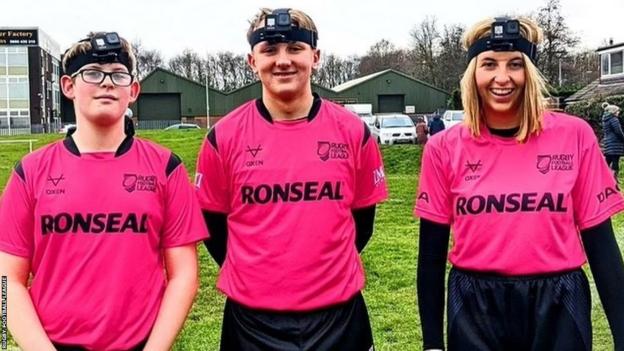Challenge Cup: Head-cams in focus as Edinburgh Eagles v Saddleworth Rangers starts BBC coverage

| Date: Saturday February 11th Begin: 13:15 GMT Cover: Live on BBC iPlayer, BBC Sport website and app |
The Edinburgh Eagles hope to put the spotlight on Scottish rugby league when they meet Saddleworth Rangers in Saturday’s televised Challenge Cup tie.
And it’s not just rugby league fans who will tune in to see a possible upset. Officials from sporting bodies across the UK will be interested.
The first round match, which pits Scotland’s strongest side against one of the most storied clubs in the English game, has been selected to be shown on BBC iPlayer and streamed on the BBC Sport website and app.
The Eagles are quietly confident they can make a bit of history after coming close to upsetting National Conference Premier Division club York Acorn in the same stage of last year’s competition.
But the addition of an additional camera to the game also causes a stir.
Referee Stuart Fraser will wear a head camera as part of Rugby Football League disciplinary action. And the referees for all other 17 cup games this weekend will also wear the same technology.
A total of 200 cameras will be worn by match officials in community matches starting this weekend to combat anti-social behavior on and off the field.
“We recognized that within community play, abuse of matchday officials, particularly younger officials, was a problem,” said Super League umpire Liam Moore.
“The problem was pretty terrible on some weekends, so we knew something had to be done.”
Over the past year, six head cameras were purchased and tested at a number of National Conference League games. The experiment was so successful that funds were found to buy a further 200 cameras for referees across the UK to use.
“The feedback we got from referees, players and coaches was just the fact that the referee had turned on a camera to deter the players’ behavior.
“We’ve had a massive improvement in discipline in the NCL over the past year,” added Moore, who is also a recruiting and development manager at the RFL.
“They see the headcam and moderate their behavior.”
And he believes the new technology will help keep more referees in the game as bad behavior and abuse are eradicated.
“These are high quality cameras and they record everything, including the sound. So everything that’s said is recorded,” Moore said.
“The biggest obstacle we’ve found in retaining umpires is they get up on a Sunday morning to officiate a game and they listen to the abuse of a dog from the sidelines, or a player or a coach, and that frightens her forever.
“We have to give the referees the right environment, especially the young ones. Some of these are 13 or 14 year olds who have never had anything to do with conflict management.
“We’re really proud of that because rugby league is a pioneer. We spoke to the Football Association and other governing bodies about how effective it was and the processes we went through.
“Obviously the FA also has a basic problem for the office. So look at what we’re doing to do something similar in football.
“It’s a sporting issue, not just a rugby league issue. It’s a societal problem. If that helps, it must be welcomed.”